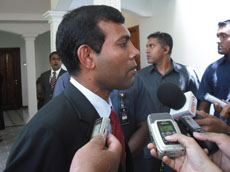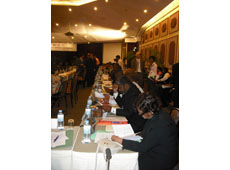Additional reporting by Neil Merrett
Tourist facilities are to be developed on Kuda Bandos, the only picnic island located near Male’ accessible to for Maldivians, following the island’s owner Vice President Mohamed Waheed Deen submitting the sole bid for its development.
Vice President Waheed Deen, also the owner of Bandos Island Resort, previously leased Kuda Bandos for US$6000 annually. However, the after the island was opened for bids on November 16, 2012 Deen submitted the sole proposal and won Kuda Bandos again for a rent of US $180,582, according to local media.
A joint venture company will be established with the Government of Maldives to develop the island, including “certain tourist facilities”, Minister of Tourism, Arts and Culture Ahmed Adheeb told local media.
The new facilities will “modernise the island” and increase government revenue, according to Adheeb.
“We don’t want to renew the agreement every two years. Now it is to be handed over through the Tourism Act and the rent will be paid just the same as the resorts,” said Adheeb.
Currently Maldivians have exclusive access to Kuda Bandos, which is located next to Bandos Island Resort, on Fridays, Saturdays and public holidays, when local families are able to travel to the picnic island for a day of relaxation on the beach.
Adheeb claimed that even after Kuda Bandos is developed Maldivians will have full, unrestricted access to the picnic island.
“After development, safari boats can go there with tourists. It will be developed so that everyone will have the opportunity,” said Adheeb. “The tourist facilities will be established to make it easier for the tourists who visit.”
Maldivian picnic island access
Despite Adheeb’s claims that Maldivians will have “unrestricted access” to Kuda Bandos, the former Secretary General of the Maldives Association of Tourism Industry (MATI), ‘Sim’ Mohamed Ibrahim, believes that developing the picnic island for foreign tourists will still limit locals’ ability to enjoy the island.
“There are less places for Maldivians to go. The problem would be solved if Mr Deen created a small island in front of Kuda Bandos [for locals]. It’s not ideal but it should serve the purpose,” Ibrahim told Minivan News today (July 18).
Whether Maldivians will have unfettered access to the sole remaining picnic island near Male’ once it is developed remains to be seen, Ibrahim does not think Maldivians enjoying the island together with tourists should be an issue.
Specifically, safari boats coming to Kuda Bandos with alcohol or foreigners sunbathing in bikinis “is a grey area”, according to Ibrahim.
“It is up to a person to decide what he wants to do or not, I don’t understand why this would be a problem,” he said.
“The question of [drinking] alcohol is not a problem, the issue doesn’t arise, because Maldivians as Muslims don’t drink,” he continued.
“[And] why would there be a problem with foreigners sunbathing in bikinis, if a lot of Maldivians are working on and visiting resorts [every] day?” he asked.
“It happens on Bandos [Island Resort] or any other resort for that matter,” he added. “As it is there is nothing to prevent Maldivians from going to resorts or accessing their facilities.”
Picnic island development
A new tourism regulation entitled the “Procedure to Follow Where the Government Undertakes Joint Venture Investment in Islands or Land”, allows a company with at least a 10 percent share held by the state to develop a resort from land set aside for tourism use, such as a picnic island like Kuda Bandos.
Land used for water sports or diving would also be included once the lease for the area is acquired by a joint venture company.
Published in the Government Gazette Volume 42, number 17 – dated January 28, 2013 – the regulation requires any joint venture partner working with the state on a tourism projects to have a minimum financial worth of US$300 million and make a minimum initial capital investment of at least US$100 million.
Tourism Minister Adheeb told Minivan News in April that the regulations applied to land such picnic islands that were effectively being used “almost as a resort”, such as areas licensed to serve alcohol to tourists, something not allowed on islands designated as “inhabited”.
“The only difference [to these islands] is that tourists cannot sleep there for the night,” he said. “Now they can stay there the night, but [operators] have to pay land rent. It is to stop the concept from being abused.”
However, an island owner involved in the country’s burgeoning mid-market holiday sector has slammed new regulations imposing financial restrictions on tourism joint venture projects with the government, claiming the legislation outright excludes small and medium-scale investors.
These recently implemented amendments to the Tourism Act served to “shut the door” on small and medium-sized investors, alleged the island owner, speaking to Minivan News on condition of anonymity.
“The real issue here would be that only those with very high net worth can be venture partners with government. Very, very few tycoons are in that wealth bracket,” the source said.
“[Former President] Nasheed’s government tried to be inclusive in offering business opportunities. This regulation is exclusive and shuts the door for medium to small-size investors to partner with the government,” the source added.
Meanwhile, the Ministry of Tourism, Arts and Culture has announced a public tender to lease several other islands across the country for development as resort properties.
Through the tender, applicants will bid for a 50 year lease to develop one of several islands including, Kunnamala in Noonu Atoll, Kudafushi and Fasmendhoo in Raa Atoll, Vanabadhi and Kani in Thaa Atoll, Dhigudhoo in Gaafu Alifu, and Ismehela Hera in Seenu Atoll.
Additionally, seven parties have expressed interest to develop tourist resorts on the islands of Madifushi in Meemu Atoll, Keradhdhoo in Gaafu Alifu Atoll, and Ismehela Hera in Seenu Atoll.
While Ismehela Hera was also included as one of the three islands the Tourism Ministry invited bids for in April, the ministry did not clarify why the island was listed twice, according to local media.
Bidding documents will be made available to Maldivian nationals for a non-refundable payment of MVR 2000 (US$130) or US$300 for foreign nationals, until July 28.
All bids must then be submitted before 1:00pm on August 1, 2013 to the ministry, where they will be opened at a ceremony held later the same day.
Former MATI Secretary General Ibrahim said the process for tenders was “pretty much standard” for obtaining an island lease.
“The investment climate is better than a year ago and source markets are improving,” said Ibrahim.
Tourism Minister Ahmed Adheeb was not responding to calls at time of press.
 (1)Dislikes
(1)Dislikes (0)
(0) “Basically there wasn’t any financial institution that could give the finance or lend the money,” said Nashid. “No international banks came and what is very noticeable there wasn’t Indian investors. Not a single Indian company was represented.”
“Basically there wasn’t any financial institution that could give the finance or lend the money,” said Nashid. “No international banks came and what is very noticeable there wasn’t Indian investors. Not a single Indian company was represented.”
